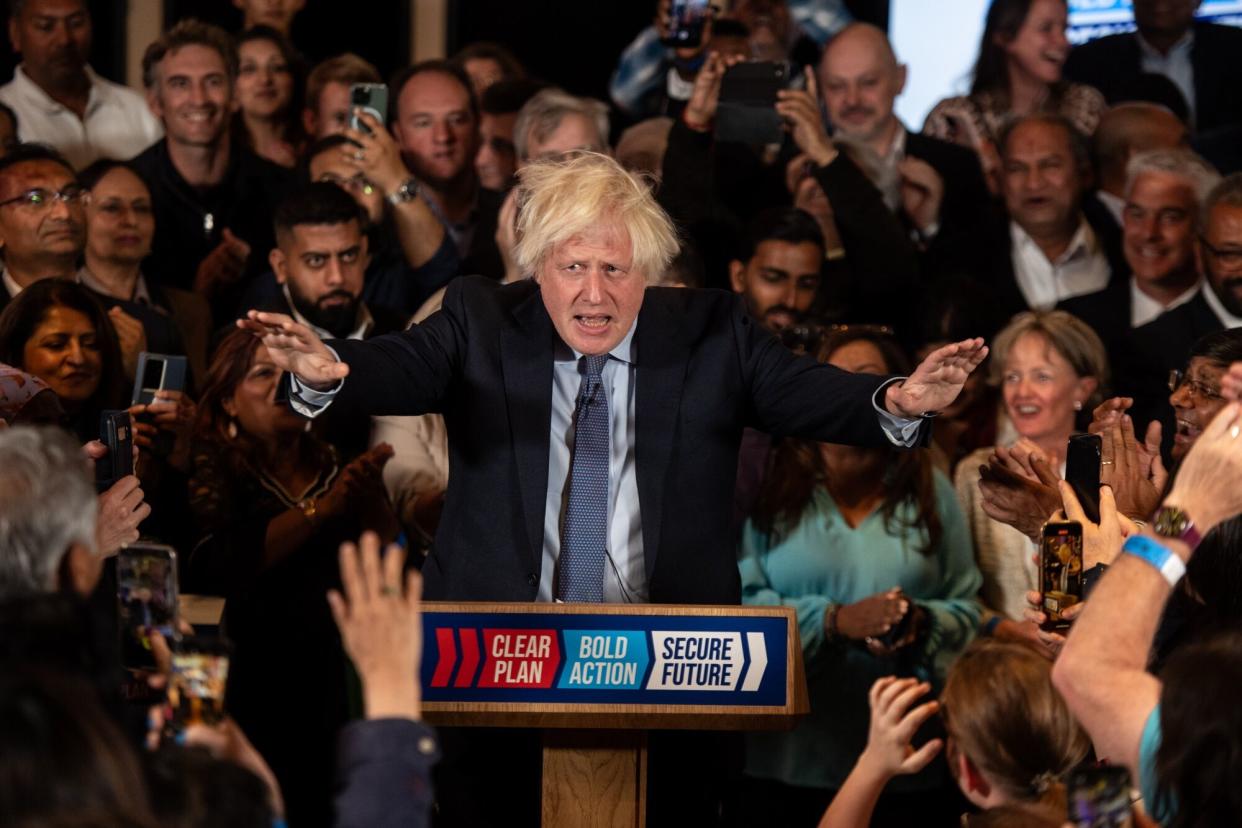Boris Johnson Makes Surprise Late Move to Avert Tory Wipeout

(Bloomberg) -- Boris Johnson unexpectedly dropped in on the UK election campaign, urging Conservative voters to deny Labour a landslide victory in a last throw of the dice by Rishi Sunak’s Tories to try to prevent huge losses that are expected in Thursday’s vote.
Most Read from Bloomberg
Biden Struggles to Contain Mounting Pressure to Drop Out of Race
China Can End Russia’s War in Ukraine With One Phone Call, Finland Says
Kamala Harris Is Having a Surprise Resurgence as Biden’s Campaign Unravels
“We cannot just sit back as a Labour government prepares to use a sledgehammer majority to destroy so much of what we have achieved,” the former premier said in an unscheduled speech in central London on Tuesday night, his first public appearance of the election campaign.
Johnson, who is not a candidate at the election, repeated Tory campaign attack lines claiming Labour leader Keir Starmer would use a “super-majority” to put up taxes and allow uncontrolled immigration, allegations the opposition party denies. He urged former Tory voters not to vote for Nigel Farage’s Reform UK party, who he called “Kremlin crawlers” and “Putin-istas,” a reference to remarks the right-wing party’s leader made about admiring Russian President Vladimir Putin.
The intervention by Sunak’s predecessor-but-one, who left office in 2022 after a series of scandals, will prove controversial as the final day of campaigning gets under way on Wednesday. Starmer on Wednesday told reporters that Johnson’s late involvement in the campaign merely served to highlight the flaws that make the Tories unsuitable to remain in government.
“I’m not worried in the slightest,” Starmer said on a campaign visit in South Wales, when asked if Johnson would help revive support for Sunak’s campaign. “Having argued for six weeks that they’re chaotic and divided, to bring out Exhibit A with 24 hours to go has vindicated the argument.”
Labour is on course to win this week’s public vote with a large majority, an outcome that would end 14 years of Conservative rule in Britain. So far, 11 of 12 so-called MRP polls carried out during the campaign project the opposition party to take more seats than it did in Tony Blair’s landslide victory in 1997. The latest, from Survation on Tuesday, projects a 318-seat majority.
Johnson, who governed Britain from 2019 until his resignation in 2022, remains a politically divisive figure. He won the 2019 general election with a large majority and retains backing among supporters of Brexit and some core Conservative voters — the sorts of people who Sunak is trying to convince to turn out Thursday.
“If these polls are right, we are about to give Labour a super-majority which they will use to make us nothing but the punk of Brussels,” Johnson said on Tuesday. The former premier — who blames Sunak for the role he played in his downfall, referred to the incumbent just once in his intervention, and the two men didn’t appear together on stage.
Over the past two weeks, Sunak has pivoted to a strategy of effectively conceding defeat — instead imploring typical Tory voters to go to the polls and back his party, rather than stay at home or vote for the right-wing Reform UK party led by Farage, another Brexit campaigner. A Labour government would have a “blank check” to do what it wants if it wins a majority in line with what opinion polls are suggesting, Sunak said at a series of campaign events earlier Tuesday.
Secretary of State for Work and Pensions, and close Sunak ally, Mel Stride conceded on Wednesday that Labour look set to win a record-breaking majority. “I totally accept that where the polls are at the moment means that tomorrow is likely to see the largest Labour landslide majority, the largest majority that this country has ever seen,” he told BBC Radio 4.
Starmer warned that Stride’s comments are part of a wider Conservative strategy to “suppress the vote.”
“They’re trying to invite people not to exercise their democratic right to go out and vote,” he told reporters. “They’re trying to dissuade people from voting.”
Johnson’s involvement in the so-called Partygate scandal involving rule-breaking parties in Downing Street during the Covid pandemic, for which he and Sunak were both fined by the police, saw his popularity among the wider voting public crater. When he left office, he had a net personal approval rating of -53 percentage points with the pollster YouGov.
Johnson has taken a back-seat role during the Tory campaign, spending much of the last six weeks abroad on vacation. That’s been seen in part as due to his poor relationship with Sunak. Some allies of Johnson blame the current premier, who served in Johnson’s government as his chancellor of the exchequer, for his ouster, because Sunak’s resignation from Johnson’s Cabinet is widely seen as precipitating his downfall.
Until Tuesday night, Johnson’s campaign activity had been limited to posting social media endorsements of some Conservative candidates, and writing columns attacking the Labour Party in the Daily Mail newspaper.
--With assistance from Irina Anghel and Isabella Ward.
(Updates with Keir Starmer’s response starting in 4th paragraph.)
Most Read from Bloomberg Businessweek
Dragons and Sex Are Now a $610 Million Business Sweeping Publishing
The Fried Chicken Sandwich Wars Are More Cutthroat Than Ever Before
For Tesla, a Smaller Drop in Sales Is Something to Celebrate
©2024 Bloomberg L.P.



